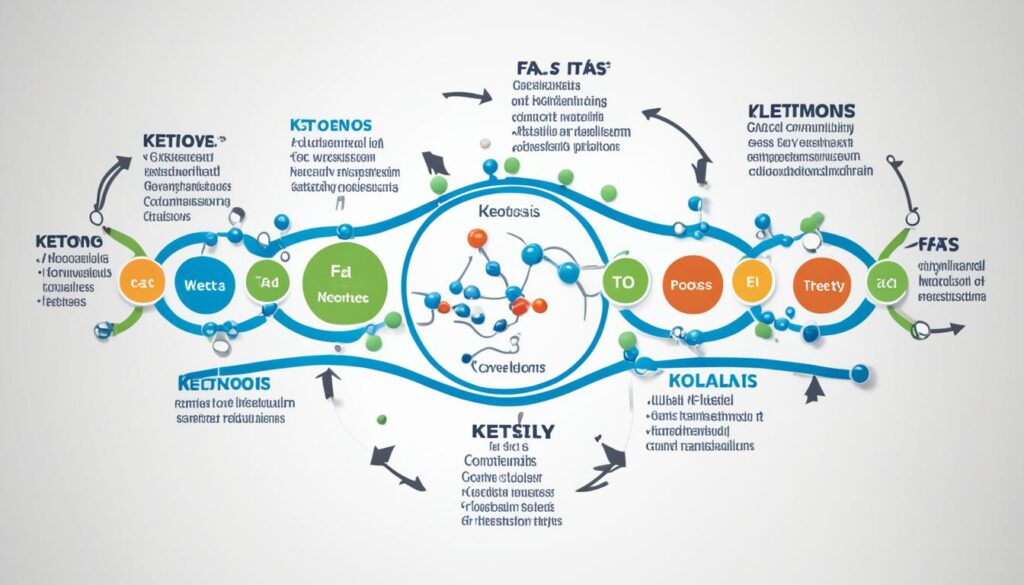Water fasting is getting more attention for its health perks, thanks to recent studies. This old practice is now in the spotlight as science shows its cellular benefits of fasting. Drinking only water for a while can boost health in many ways, like improving heart health, helping with weight loss, and starting a natural cleaning process called autophagy.
But, water fasting isn’t right for everyone. It’s important to be careful with it. People with health issues, or those who are pregnant or breastfeeding, should talk to a doctor before starting. They can help make sure the benefits of intermittent fasting are safe. As we learn more, the water fasting research shows how fasting can change how we think about health.
Key Takeaways
- Water fasting has profound effects on enhancing cellular health through processes such as autophagy.
- Specific populations must approach water fasting with caution, under the guidance of healthcare professionals.
- Research underscores the importance of a careful refeeding phase post-fasting to sustain health benefits without undue risk.
- Extended fasting periods invoke significant implications for weight management and systemic health.
- Robust scientific evidence supports the integration of water fasting into a holistic approach to wellness.
- Progress in water fasting research continues to elucidate the vast cellular mechanics behind fasting.
Understanding Water Fasting and Its Historical Significance
Water fasting is an ancient practice that has grown into a modern health trend. It’s known for helping with longevity and well-being. People used to do it for spiritual reasons, but now, it’s popular for its health benefits like weight control and better cell function.
The Evolution from Spiritual Practice to Wellness Trend
In the past, fasting was a way to clean the body and spirit. Now, it’s taken up by those looking for health benefits. Science shows that fasting can help with cellular autophagy, which is important for cleaning out old cells and fixing tissues.
Who Should and Shouldn’t Consider Water Fasting
Kaytee Hadley, a dietitian in Richmond, says to be careful, especially with certain groups. Not everyone can safely fast. Kids, teens, older people, and those with health issues should not fast. Pregnant or breastfeeding women should also avoid it without a doctor’s okay.
Fasting can help with things like better insulin use and less inflammation, which can prevent chronic diseases. But, it can also cause dehydration and imbalance of electrolytes. So, it’s important to talk to a doctor before starting. Start with short fasts and slowly increase the time to stay safe.
For more on the effects and uses of fasting, keep reading. We’ll go into the details of how it helps cells and overall health.
Exploring the Cellular Benefits of Water Fasting: Recent Studies
Recent studies have greatly improved our understanding of fasting’s effects on cells and health. A key study in Nature Metabolism shows how water fasting for cellular health helps with weight control and cell repair. This is vital for long-term health.
These studies focus on metabolic changes during fasting. They found that fasting changes how cells use energy. It shifts to using fatty acids more, which can lead to ketosis after glycogen is used up. This switch helps with fat loss and starts cell repair processes like autophagy. Autophagy is key in removing old cells and making new ones.
Studies also looked at how fasting affects hormones and chemicals in the body. For example, fasting can make insulin work better and lower blood sugar. This could help manage diabetes without medicine.
| Metabolite | Control Group (Day 6) | Fasting Group (Day 6) |
|---|---|---|
| Picolinic Acid (PIC) | Low | High |
| Kynurenic Acid (KYNA) | Low | High |
| 3-Hydroxykynurenine (3-HK) | Low | High |
| Tryptophan (TRP) | Normal | Low |
| Quinolinic Acid (QUIN) | Normal | Low |
The study found more Picolinic and Kynurenic acids, which protect the brain. This suggests water fasting could help with brain health. On the other hand, Tryptophan and Quinolinic acid levels went down. These are linked to inflammation and brain damage, showing fasting’s broader health benefits.
In summary, these studies show that fasting does more than just help with weight loss. It boosts metabolic health, lowers inflammation, and may even help us live longer. These findings could lead to new ways to manage health issues linked to metabolic diseases and aging.
The Impact of Water Fasting on Cellular Health
Exploring the cellular health benefits and water fasting benefits shows a new way to improve health. By eating less, water fasting starts many changes in the body. These changes help the body work better and live longer.
Enhanced Insulin Sensitivity and Blood Sugar Regulation
Water fasting can help control blood sugar levels, which is key for good health. Studies show it can make insulin work better. For example, a 2021 study found that a 36-hour fast helped people with type 1 diabetes a lot.
The Role of Autophagy in Cell Renewal and Longevity
Autophagy is a process that helps clean and renew cells. It’s started by water fasting. This process helps cells stay healthy and fight off diseases. Studies in 2014 showed how fasting starts autophagy, which is good for cells and fighting aging.
- Weight loss and better metabolic health from eating less and burning fat.
- Cells get cleaned out through autophagy, making the body healthier.
- The brain works better, with more focus, since it’s not busy digesting food.
- New white blood cells are made, helping the immune system.
- It has anti-inflammatory and anti-aging effects by reducing stress and keeping mitochondria healthy.
| Study | Year | Focus | Key Findings |
|---|---|---|---|
| Trepanowski et al. | 2017 | Alternate-Day Fasting | Weight maintenance and cardioprotection. |
| Elias et al. | 2023 | Cognitive Health & Alzheimer’s | Positive effects on cognitive health. |
| Moser et al. | 2021 | Type 1 Diabetes | Impact of a 36-hour fast on adults with Type 1 diabetes. |
| Wilhelmi de Toledo et al. | 2019 | Extended Fasting Periods | Improvements in safety, health, and well-being. |
Adding fasting to our lives can bring big cellular health benefits. It could be a key way to stay healthy and prevent diseases. This approach opens up new ways to understand our bodies and could change how we think about health and living longer.
Scientific Perspectives on Water Fasting and Weight Loss
Scientists are looking into water fasting as a way to manage weight. Recent studies show it does more than help with weight loss. It also improves heart health and makes metabolism more efficient. Experts agree that fasting can lead to a state called spontaneous ketosis, which is good for health.
Recent studies show water fasting can lead to a 4% to 6% weight loss in just five days. But, some of this weight loss comes from losing muscle, not just fat. This is important to know when looking at the health effects of fasting.
Research also looks at how fasting affects muscles. It can help reduce inflammation and clean out old cells. But, if you don’t eat enough protein, fasting can harm muscles and slow down your metabolism.
- Intermittent fasting results in around 0.5-1 lbs of weight loss per day.
- Most participants regain the weight post-fast, emphasizing the importance of strategic dietary planning post-fasting.
- Extended fasting has shown to induce autophagy but can lead to muscle loss, influencing long-term metabolic rates.
Water fasting can help with weight loss but has its risks. It can lead to quick weight loss but might harm muscle and metabolism if not done right. It’s important to talk to a healthcare provider to make fasting safe and effective.
Navigating the Risks and Safe Practices of Water Fasting
Water fasting is becoming more popular, so it’s key to know the risks of water fasting and how to avoid them. Studies on water fasting show how different fasting plans affect health.
Short-Term Side Effects and Their Management
Short-term fasting has benefits but can also cause dehydration, lack of nutrients, and an imbalance of electrolytes. Beginners should start with short fasts to see how they feel. It’s important to drink plenty of water during this time.
Seeking Medical Supervision for Long-Term Fasting
If you’re thinking about fasting for a longer period, getting advice from a doctor is a must. They can watch your health closely and adjust the fast to fit your needs, lowering the risks.
Here’s what a recent study on water fasting found:
| Statistic | Value |
|---|---|
| Median Fasting Length | 17 days |
| Median Refeed Length | 8 days |
| Completion Rate | 54% |
| Decrease in Systolic Blood Pressure | Mean Decrease |
| Decrease in LDL | Mean Decrease |
| Decrease in hsCRP | Mean Decrease |
| Increase in Triglycerides | Observed |
| Increase in HOMA-IR Scores | Observed |
These stats and the risks of water fasting help people and doctors make safe fasting plans. This way, they can meet health goals safely.
The Role of Ketosis in Fasting-Induced Fat Loss
Fasting, including water fasting and intermittent fasting, offers many health benefits. These benefits include better metabolic flexibility and losing a lot of fat. The key role of ketosis in these benefits is clear. It shows how fat is used for energy when calories are low and helps keep muscle mass while burning more fat.
Understanding Ketosis and Its Metabolic Benefits
When fasting, the body uses stored fat for energy, entering a state called ketosis. This means making ketone bodies, which are a great energy source for the brain and other tissues. Studies have shown that ketosis keeps energy levels up and the mind clear, which are big benefits of water fasting. Also, intermittent fasting helps start ketosis by alternating eating and fasting. This improves glucose metabolism and lowers inflammation.

Maintaining Muscle Mass While Maximizing Fat Loss
One worry about fasting is losing muscle mass, especially with a lot of calorie cutting. But ketosis helps by using fat instead of muscle for energy. This is key for athletes or people who exercise a lot and need to keep their muscle.
Studies on athletes show that being in a ketogenic state helps with fat loss and keeps muscle mass. This is because of better hormone levels, like more growth hormone and less insulin.
In summary, ketosis is key in fat loss strategies like intermittent fasting or longer water fasting periods. By using ketosis, people can improve their metabolic health and manage their body composition well.
Post-Fasting Strategies for Sustainable Health Benefits
After a water fast, it’s important to plan your nutrition carefully. You want to keep the good effects of fasting, like better insulin use and detox. This means adding foods back into your diet in a way that keeps these benefits.
When you start eating again, start with small meals. Foods like broths, yogurts, and cooked veggies are good choices. They help your body adjust without upsetting your stomach. Remember to drink lots of water to help with digestion and getting nutrients.
- Begin with small servings of easily digestible foods
- Gradually include more complex foods over several days
- Continue to consume plenty of fluids, focusing on water and non-caffeinated herbal teas
- Monitor physical responses to reintroduced foods and adjust accordingly
How you eat right after fasting can affect how well it works in the long run. Eating well can help keep your blood fats low and your metabolism strong. A good diet supports your body’s new state.
| Post-Fasting Dietary Focus | Benefits |
|---|---|
| Hydration | Maintains fluid balance, aids digestion |
| Probiotics | Supports gut health, enhances immune function |
| Antioxidants | Combats oxidative stress, supports cellular repair |
| Lean Proteins | Helps in muscle recovery and growth |
| Whole Grains | Provides sustained energy, improves satiety |
Planning your meals after fasting can help keep the good changes you got from fasting. Whether you want to lose weight, improve your metabolism, or live longer, these tips can help. They can be a guide for ongoing health improvement.
Case Studies: The Therapeutic Potential of Prolonged Fasting
Water fasting is more than just a spiritual or physical cleanse. It’s a powerful tool for treating health issues and improving cellular health. Studies show that fasting can greatly benefit people with chronic conditions.
Research Findings on Systemic Changes and Health Outcomes
A study from the Norwegian School of Sports Sciences looked at people fasting for 10 days. They wanted to see how it affects health, especially for heart disease and rheumatoid arthritis. The results highlight the need for more research on fasting and its effects on health.
Identifying Conditions That Benefit from Fasting Interventions
Fasting can change the risk factors for chronic diseases, research finds. At Queen Mary University of London, scientists found changes in organ proteins after just three days of fasting. This shows fasting’s impact goes beyond just cutting calories.
| Parameter | Baseline | During Fasting (Day 10) | Post-Fasting Recovery (Day 5) |
|---|---|---|---|
| Body Weight (kg) | 85.3 | 77.1 | 78.9 |
| Blood Glucose (mmol/L) | 5.4 | 4.8 | 5.1 |
| β-Hydroxybutyrate (mmol/L) | 0.2 | 1.3 | 0.5 |
| Resting Systolic BP (mmHg) | 132 | 113 | 118 |
| Lean Mass Index (kg/m²) | 20 | 18.5 | 19.2 |
| High-sensitivity C-reactive Protein (mg/L) | 3.0 | 1.5 | 2.0 |
These results show how fasting affects the body, especially in managing energy and metabolism. Lower levels of high-sensitivity C-reactive protein suggest fasting’s anti-inflammatory effects.
These studies and others show fasting’s big potential in medicine. They suggest it can help manage chronic diseases and boost cellular health.
Proteomic Insights: Understanding Fasting at the Molecular Level
Recent water fasting research has shown how fasting changes the body at a molecular level. A seven-day water-only fast revealed changes in protein structures. These changes could lead to health benefits and help manage chronic diseases.
Researchers looked into the proteome, which is all the proteins in a cell or body. They used advanced techniques to find important changes in proteins linked to health. These changes give us new insights into how fasting affects cells.
These findings are key to understanding how fasting can boost cellular health. They show how fasting changes cell metabolism, including reducing inflammation and improving repair. This could lead to new ways to treat chronic diseases.
Advanced proteomic analyses highlight that water fasting stimulates mechanisms which may lead to better management of inflammation and stress resistance at a cellular level.
This research is vital for learning about fasting’s benefits for cellular health. It helps make fasting a more effective treatment. It also helps tailor fasting plans to fit individual health needs, making it safer and more effective.
Adapting Fasting Practices for Optimal Cellular Health
Starting a fasting journey can be tailored to improve cellular health. Studies show water fasting has big benefits for the body. By choosing from different fasting types, like alternate-day or whole-day fasts, you can find what works best for you.
Gradual Fasting Approaches for Beginners
For beginners, starting slow with fasting is a good idea. Begin with eating less on alternate days and gradually increase the fasting time. This way, your body can adjust without stress.
Starting slow helps avoid side effects and gets your body ready for the metabolic changes fasting brings. This makes fasting more effective and easier to keep up with.
Hydration and Nutrient Management During Fasts
Dr. Johannes Uys says staying hydrated is key during fasting. Even if you’re not skipping water, it’s important to drink enough. This helps your body detox and keeps nutrients balanced.
Drinking enough water and eating right when you start eating again helps your body adjust smoothly. This keeps your cells healthy and helps you stick with fasting. Studies like the GENESIS trial show how fasting can improve health and increase lifespan when done right.
Source Links
- Post-fast refeeding enhances intestinal stem cell-mediated regeneration and tumourigenesis through mTORC1-dependent polyamine synthesis
- Autophagy Fasting: What You Should Know Before Starting Your Fast – Unlocking Insights – Explore Our Articles
- Human molecular adaptations to fasting: Insights from proteomic analysis
- Is Water-Only Fasting Safe?
- Water Fasting: Exploring the Potential Risks and Rewards
- Exploring the effect of prolonged fasting on kynurenine pathway metabolites and stress markers in healthy male individuals – European Journal of Clinical Nutrition
- Can Fasting Help You Live Longer? Exploring the Science Behind Fasting and Aging
- A single 36-h water-only fast vastly remodels the plasma lipidome
- The benefits of water fasting: Achieve optimal health and wellness
- The Effect of Fasting on Human Metabolism and Psychological Health
- Fasting can help you lose weight, but you might gain it back quickly
- Water Fasting For Weight Loss- Benefits and Risks | Vecura
- The Effects of Prolonged Water-Only Fasting and Refeeding on Markers of Cardiometabolic Risk
- The Complete Water Fasting Guide – Safely Unlock Health Benefits?
- Dawn-to-dusk dry fasting leads to health benefits in the study of immune cells
- The Effects of Fasting or Ketogenic Diet on Endurance Exercise Performance and Metabolism in Female Mice
- Nutritional Ketosis for Weight Management and Reversal of Metabolic Syndrome
- Role of Ketogenic Diets and Intermittent Fasting in Neurologic Diseases, Cancers, and Obesity: A Systematic Review of Human Studies | Chelikam
- 8 Health Benefits of Fasting, Backed by Science
- INTERMITTENT FASTING AND HUMAN METABOLIC HEALTH
- Effects of 10-Day Complete Fasting on Physiological Homeostasis, Nutrition and Health Markers in Male Adults
- A Pilot Study on the Effects of Medically Supervised, Water-Only Fasting and Refeeding on Cardiometabolic Risk
- Cambridge scientists discover how fasting turns up the body’s natural inflammation fighter
- Innate immune remodeling by short‐term intensive fasting
- Traditional and Medical Applications of Fasting
- Frontiers | Long-term fasting: Multi-system adaptations in humans (GENESIS) study–A single-arm interventional trial




